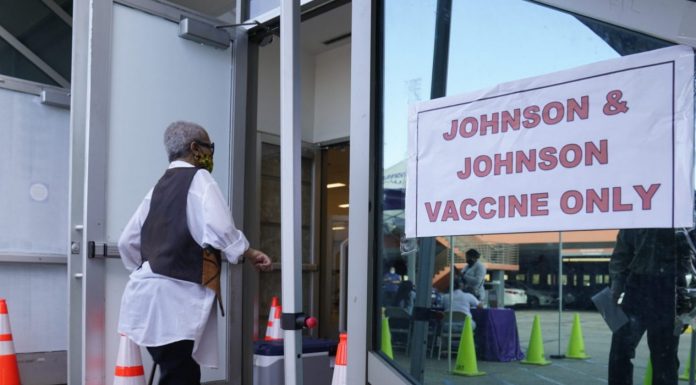Two government agencies overseeing the coronavirus vaccine effort recommended a pause to the single-dose Johnson & Johnson COVID-19 vaccine following reports of rare blood clots among six women.
Today FDA and @CDCgov issued a statement regarding the Johnson & Johnson #COVID19 vaccine. We are recommending a pause in the use of this vaccine out of an abundance of caution.
— U.S. FDA (@US_FDA) April 13, 2021
“COVID-19 vaccine safety is a top priority for the federal government and we take all reports of health problems very seriously,” read a joint statement from the the Centers for Disease Control and Prevention and the Food and Drug Administration.
“People who have received the J&J vaccine who develop severe headache, abdominal pain, leg pain, or shortness of breath within three weeks after vaccination should contact their health care provider,” they added.
All six cases occurred in women ages 18 to 48, with symptoms developing six to 13 days after they received the shot, according to a report from CNBC.
The agencies planned to undertake a review to understand better what might have caused the reaction.
“Until that process is complete, we are recommending a pause in the use of this vaccine out of an abundance of caution,” said the joint CDC/FDA statement.
Johnson & Johnson’s vaccine, the third to become widely available in the US, relies upon a different sort of technology than the leading Moderna and Pfizer vaccines, both of which require two doses for maximum efficacy.
According to the FDA, as of April 12 more than 6.8 million doses of the Johnson & Johnson vaccine have been administered in the U.S.
The report follows concerns regarding the AstraZeneca vaccine in Europe, noting similar blood-clotting issues. AstraZeneca’s vaccine has yet to be approved in the US.
The leading COVID-19 vaccines train the body to recognize the spike protein that coats the outer surface of the coronavirus, according to the Associated Press.
However, the science behind how Johnson & Johnson and AstraZeneca deliver that protein is slightly different.
“J&J and AstraZeneca use the same platform for their vaccines,” Isaac Bogoch, an infectious disease specialist, told CNBC. “The J&J and AstraZeneca vaccines use an adenovirus, a common type of virus that typically causes mild cold symptoms,” he said.
European regulators last week announced a possible link between the shots and a very rare type of blood clot that occurs together with low blood platelets. It seems to occur more in younger people, said the AP.
The news of the announcement already was likely to impact vaccination efforts in the US, where widespread skepticism of the vaccines remains an issue.
The health questions surrounding the vaccine’s safety also further compound concerns about a so-called vaccine passport, supported by a growing number of left-leaning companies and agencies.
Florida Gov. Ron DeSantis, who denounced the vaccine passports as being invasive to both privacy and civil liberties, has faced a barrage of media attacks since speaking out.
Former president Donald Trump, whose Operation Warp Speed was responsible for developing the vaccines in an unprecedented eight months, criticized the Biden administration for pausing the vaccine on such a flimsy basis.
Trump said they had done a “terrible disservice” by fomenting distrust in the effort, and he suggested that lobbying efforts from Pfizer may have played a role.
“The results of this vaccine have been extraordinary but now its reputation will be permanently challenged,” Trump said in the statement. “The people who have already taken the vaccine will be up in arms, and perhaps all of this was done for politics or perhaps it’s the FDA’s love for Pfizer.”
Despite the rampant concerns, the Biden administration claimed the pause would not present a problem for distribution of the other two vaccines.
“Based on actions taken by the President earlier this year, the United States has secured enough Pfizer and Moderna doses for 300 million Americans,” a White House statement from earlier today reported.
“Over the last few weeks, we have made available more than 25 million doses of Pfizer and Moderna each week, and in fact this week we will make available 28 million doses of these vaccines.”
Headline USA’s Ben Sellers and the Associated Press contributed to this report.

